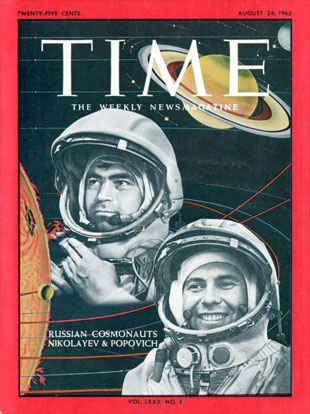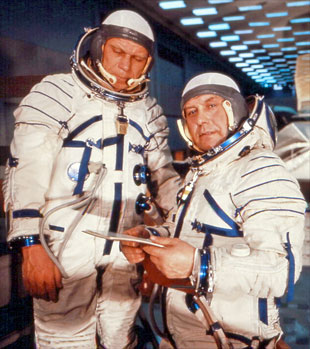September 30, 2009 — The sixth man to orbit the Earth, Pavel Romanovich Popovich died Wednesday, five days before his 79th birthday. According to officials in Russia, his death came following a stroke at a hospital in Gurzuf on Ukraine's Crimean Peninsula.
"Pavel was a wonderful person," recalled first woman in space Valentina Tereshkova, in an interview with RIA Novosti. "A professional cosmonaut, devoted to his work, and he was also a good friend."
The first to be chosen among the Soviet Union's original 20 cosmonaut candidates, Popovich was considered for the country's -- and world's -- first spaceflight, which was ultimately flown by Yuri Gagarin. Instead, he served as capcom for Vostok 1, conveying commands between the ground and Gagarin in space.
Popovich's own first flight came more than a year later in August 1962 aboard Vostok 4. Originally slated for launch as much as nine months earlier, his solo orbital flight was re-planned in an effort to further the Space Race, topping the planned efforts by the United States to launch John Glenn on America's first orbital mission in late 1961.
Although he still launched alone on-board the one-seater spacecraft, Popovich was not the only cosmonaut in orbit on August 12, 1962. Waiting for him was Vostok 3 pilot Andrian Nikolayev, who launched the day before, marking the first time two manned vehicles were in space at the same time.

Nikolayev and Popovich on TIME's cover. (Time Inc.) |
Although they would come within about 3 miles (5 km) of each other, close enough to see each other's spacecraft, their mission was not to rendezvous, as was incorrectly assumed by press reports. The Vostok capsules were not equipped to maneuver. Instead, the tandem flights were aimed at learning how to manage concurrent missions while further studying the effects of extended spaceflight on the human body.
Nikolayev remained in orbit nearly four days, setting yet another record for the Soviet Union. Popovich might have also flown for four days had it not been for his Vostok failing to maintain its interior temperature, leading to the decision to land after three days.
Popovich himself almost brought his mission to an early end when he reported seeing "thunderstorms," a pre-set codeword he was to use to signal that he was ill. While the ground scrambled in response, Popovich realized his error and radioed to report that he was fine and had really seen lightning over the Gulf of Mexico.
Popovich returned to Earth, ejecting from Vostok 4 and parachuting to the ground as was planned, on August 15, 1962. He successfully completed 48 orbits of the Earth.
It would be more than a decade before he would return to space, in large part due to the failed Soviet effort toward landing cosmonauts on the Moon. Assigned to command one of the lunar missions, Popovich trained for the Moon from 1966 through 1968 before being reassigned to fly to the Soviet Union's first military space station in the wake of the lunar program being disbanded.
Popovich's second spaceflight was further delayed when its target, disguised by the civilian name Salyut 2, failed in orbit, losing pressure, flight control and eventually all of its power before reentering in 1973.

Soyuz 14's Artyukhin and Popovich (Spacefacts.de) |
Finally on July 3, 1974, Popovich lifted off as commander aboard Soyuz 14, a 16-day mission to what was the first Almaz manned military station, Salyut 3. Together with Yuri Artyukhin, Popovich tested the use of the outpost as a reconnaissance platform using 14 different cameras.
Popovich returned to Earth for the second and last time on July 19, 1974, logging a career total of just under 19 days in orbit as the first ethnic Ukrainian to fly in space.
Popovich remained involved in space exploration beyond his own missions. For nine years beginning in 1980, he served as deputy chief of the cosmonaut training center at Star City, where he had been the first to report twenty years earlier.
In the late 1980s, Popovich was appointed director for the Russian Institute for Land Ecosystem Monitoring, which develops remote sensing satellites for land management and agriculture.
"I was able to look out of my porthole a lot, and like anyone who looks at the planet from space I realized -- I am convinced -- that the Earth is not the property of any one person or country," recounted Popovich for the 2007 book "Into That Silent Sea" by Colin Burgess and Francis French. "It belongs to us all."
A decorated Major General in the Russian Air Force, he was twice awarded as Hero of the Soviet Union. Popovich lived to see his name lent to an Antarctica mountain ridge and an asteroid.
He is survived by his wife Alevtina Oshegova and two daughters from a former marriage.
